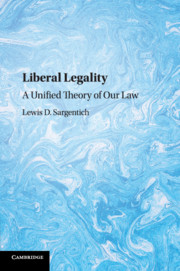Book contents
- Liberal Legality
- Liberal Legality
- Copyright page
- Dedication
- Contents
- Preface: Law’s Quest
- Introduction Toward Unification
- 1 The Idea of Law-Like Law
- 2 Argument in a Legal System
- 3 Practice of Legality
- 4 Pursuit of the Rule of Law
- 5 Aspiration and Impulse
- 6 Deep Duality: Formal Law
- 7 Deep Duality: Law’s Ideals
- 8 Two Perils for Law
- 9 Fear of Free Ideals
- 10 Fear of Open Form
- 11 Modern Liberal Practice
- 12 Legality Recapitulated
- References
- Index
12 - Legality Recapitulated
Published online by Cambridge University Press: 20 April 2018
- Liberal Legality
- Liberal Legality
- Copyright page
- Dedication
- Contents
- Preface: Law’s Quest
- Introduction Toward Unification
- 1 The Idea of Law-Like Law
- 2 Argument in a Legal System
- 3 Practice of Legality
- 4 Pursuit of the Rule of Law
- 5 Aspiration and Impulse
- 6 Deep Duality: Formal Law
- 7 Deep Duality: Law’s Ideals
- 8 Two Perils for Law
- 9 Fear of Free Ideals
- 10 Fear of Open Form
- 11 Modern Liberal Practice
- 12 Legality Recapitulated
- References
- Index
Summary
- Type
- Chapter
- Information
- Liberal LegalityA Unified Theory of Our Law, pp. 162 - 168Publisher: Cambridge University PressPrint publication year: 2018



